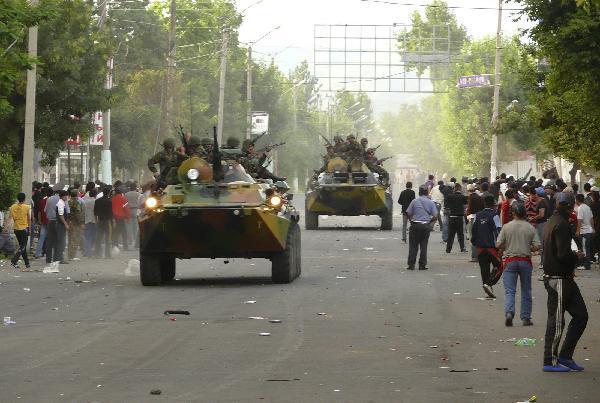Kyrgyzstan's unrest exposes heavy political jockeying
|
Servicemen drive armoured vehicles in the city of Osh in southern Kyrgyzstan June 11, 2010. [Xinhua/Reuters] |
Widespread riots have for days rattled southern Kyrgyzstan, leaving at least 124 dead and 1,685 injured. The unrest has caused grave concern in the international community.
Power struggle
The latest spate of clashes broke out on Thursday night with a casino scuffle between ethnic Kyrgyz and Uzbek youngsters in the southern city of Osh, and rapidly escalated into massive riots.
The turmoil was widely considered a continuation of the riots that plagued the country for weeks since a revolt ousted former President Kurmanbek Bakiyev and brought to power a transitional government led by Interim President Roza Otunbayeva in early April.
Meanwhile, the bloodshed came at a sensitive juncture -- two weeks before a scheduled referendum on a new constitution. On one hand, the departure of Bakiyev left a political vacuum in Kyrgyzstan and made it all the more urgent to restore law and order.
On the other hand, the draft of the new constitution presented by the interim government was rejected by different political groups as well as a considerable part of the general public. Some critics noted that many provisions in the draft were ambiguous and even self-contradictory.
Otunbayeva on Saturday blamed Bakiyev and his supporters for the recent clashes and accused them of attempting to forestall the upcoming vote, while Bakiyev, currently in exile in Belarus, denied the charges.
Local analysts said that as the referendum marked a major step to legitimize the interim government, some political forces excluded from the government wanted to thwart the voting or even force a government reshuffle by playing up the ethnic conflicts in the south.
Alexei Makarkin, deputy director of the Moscow-based Center for Political Technology, said the flare-up came as a strong warning by various political forces in southern Kyrgyzstan that the interim government must allow others to share power.
Stability efforts
Following the latest surge of violence, the interim Kyrgyz government made a series of moves to restore peace and stability to the southern area and change the impression among the public of incompetence in maintaining social order.
On the security front, the government has dispatched police and military forces, including special forces and armored units, from across the country to the south, and recruited large numbers of new soldiers.
The security forces have set up posts in Osh and Jalalabad, to check vehicles, and they also search for weapons and detain members of the armed groups.
The government has also authorized law enforcement officers to use lethal weapons against mobs who burn civilian houses, attack government buildings and commit ethnic killings.
Economically, the government has collected relief materials from all over the country for the restive region. Local authorities in Osh have warned that local residents would starve if no significant relief came in 10 days.
Besides, police have evacuated women, children and the elderly living in ethnically mixed neighborhood. Meanwhile, the government on Monday began sending cellphone texting messages to help evacuate the needy and calm the public following the collapse of Internet, TV broadcast and newspaper delivery services.
 0
0 







